Reflections on Our Pilgrimage Into Society
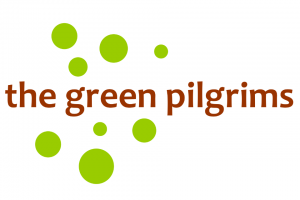
In February 2016, we started out on a pilgrimage—one with no time limit. Beforehand, we had given away all our possessions except the contents of our two rucksacks. The wish to do so came up when we were planning our first pilgrimage from October to December 2015 from our home in Switzerland to the World Climate Conference in Paris.
There’s no single motivation for what we’re doing. Each of us has his or her own motives, aspirations, and vision. What binds us, however, is our belief in the common sense of this new stage in our joint life journey. The name we have chosen for our website, the green pilgrims, fits the manifold topics we stand for and want to move.
On this pilgrimage into society, walking no longer has priority. We want to meet people to swap ideas and inspire each other. In the simplest form, we do this under the title ‘green thoughts’—an exchange of one to two hours with a few or many interested people. We ask strangers in the street, in a café, or in front of their homes if we can stay with them. Some people ask their friends and network if somebody wants to host us for a while. People we hardly know will ask us if we want to live in their house for a few weeks while they are away.
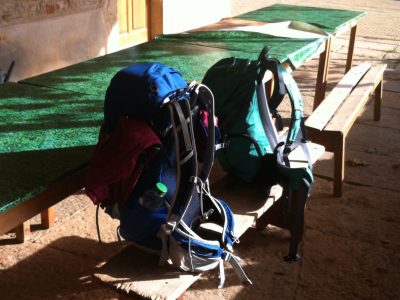
It happens in an instant. We trust; the people trust. We are all courageous in this together. Asking, offering, giving, sharing, taking, and thanking. Talking at a conference or in front of some students, collaborating, soul-storming and mind-mapping a project with somebody, or doing a vision workshop for a working team.
Life still has its own very special ideas. In December 2016, Sesto was told that both hips needed to be replaced. Not thinking twice, Sesto intensified his self-healing work. It seems that’s when our pilgrimage began in earnest.
For Kosmos Journal, we have asked each other some questions to reflect on our pilgrimage into society so far.
Gabriele asks Sesto…
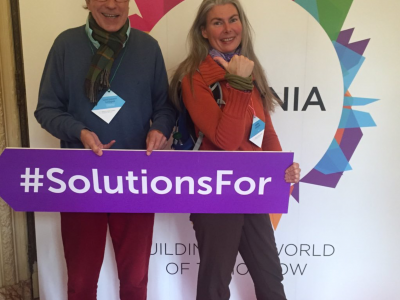
Dear (life) companion, did you gain any new insight on our common pilgrimage?
Yes! I felt deeply the loneliness and the feeling of being socially weak that people living on the street must have. I always had compassion when seeing people lying on the street, when I walked home in a cold night in Switzerland, but I had a warm place to go inside. One day in Germany, this feeling overcame me. I am still very grateful to this day, even thinking about it. It was just one moment for me, but others have this feeling daily. On a rainy day, I could feel what it does to me being in a cultural centre with a library. I sometimes would see our friends from the street seeking warmth, but they had to go out again into the rain and bad weather because they were not accepted. We have been luckier with our nice clothes and rucksacks. One day we tried to eat from our rucksack and someone came and said: “You are not allowed to do this here!” So, where to go… Suddenly, I had the feeling of being part of the aliens from the street. No more a sophisticated ‘green pilgrim.’ Fear, disbelief, strange feelings about our society all rushed into my body and mind in a second.
We called ourselves the green pilgrims. This provokes different images in the perception of people. Today, how would you like to come across?
I would like to come across like I am myself in the deepest way possible. It is so wonderful to be recognized as the one who you truly are. I love the name we have, the green pilgrims, but it does not really matter. At the same time, I like that it provokes different images with different people. The name is ambiguous. For me, ‘green’ stands for nature and ‘the pilgrims’ for the inner path. This is what characterizes me: I treasure nature as a gift from God and I follow my inner wisdom. When people ask about ‘the green pilgrims,’ I describe my thoughts about the name and listen to what they think about it. Dialogues start naturally and have led to wonderful conversations with people from all walks of life.
Quite a few of the people that we met are everyday heroes. Who in particular touched your heart and why?
Indeed! I would not like to take one everyday hero out of all the wonderful and unique human beings we have seen on our way. They all touched my heart in a very particular way. They opened their homes to us. They shared their food with us. They looked after us like family members. Writing this, I now feel tears coming into my eyes, thinking about the many wonderful souls who hosted us and joined us in our ‘green thoughts.’ I am overwhelmed by the generosity and love of the people we met, the understanding, the help, and the deep conversations. It gives me so much hope for our world and for Mother Earth in particular.
When you think of your time as a well-off businessman, a family man, someone who initiated the World Spirit Forum to bring spiritual networks together, and now living as a ‘have-not’ pilgrimaging through society, what have been your greatest challenges?
As I look at different stages of life, each one seems to have had its own great challenge. In business, I could have done many things differently. As a father and family man, I definitely made many mistakes. The World Spirit Forum opened my eyes wide and now the pilgrimage is evolving me every day, thanks to my fellow brothers and sisters. As one evolves, I think the challenges become less weighty. Maybe a great challenge 30 years ago would be a small challenge today.
But going deeply into your question about the greatest challenges, I may say that it was my time in West Africa. The time was so special, the continent, the culture, Mother Africa, the experiences, the suffering, the poverty, and the hunger. I was in another world and another culture, still living like a European, not like an African. I loved the people, felt at home, and wanted to stay there. I felt the difference from Europe. Back in Switzerland, I used to say to my friends: “In Africa, they have nothing and are always smiling—sharing with you what they have. Here most people have everything, yet so many have unhappy faces. Our richness is the money; their richness is the soul.” Africa was my spiritual awakening.
Do you think our way of living has an effect on our world and the people we meet?
When I listened to the people we met on our pilgrimage so far, it seems to me that, yes, we have affected some. They are astonished and ask, “Is it possible to live like this?” It may affect them more as they start to think more about it. They may lose fear and gain faith. Definitely, I think the exchanges with the people we met and still meet are very deep and touch their souls.
Sesto asks Gabriele…
Dear soulmate and partner in life, looking back upon your life path through different stages in the business world, then co-organizing the World Spirit Forum, living in an apartment in a Franciscan monastery shelter, developing oralab, and now on this pilgrimage, what was your inspiration to choose this way?
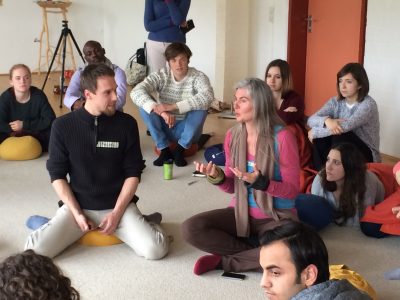
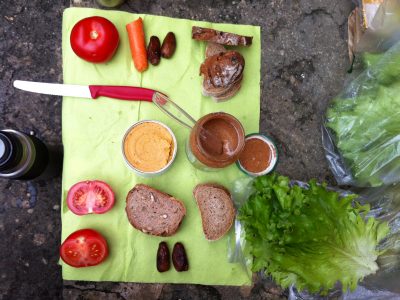
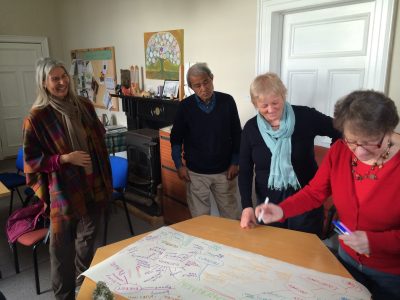
It was about being human or, better to say, becoming human. The world of advertising and marketing was very superficial and I was missing authentic interchange between myself and others. I was surely lacking in my connections at that time, too. Working with you and other like-minded people on the World Spirit Forum was a great opportunity to combine my business skills with all the issues that my mind and soul were longing for. Our time at the monastery shelter in Baldegg near Lucerne felt somehow like coming home. I once said that the place had found us. Surely there was some re-member-ing from another lifetime—like with you. When we met, there was a knowing of each other. It was clear from the beginning that there was a common mission for us together. It was like someone was telling us: “Go for it.”
When I originated ‘oralab—develop mutually,’ I finally turned from business skills to my gifts—from profession to calling. And the pilgrimage? It was already there, even when we didn’t know anything about our shared future. Looking back on my life, there were a lot of signs that pointed in this direction. From the beginning and more and more today, my way of living was what the media calls a sufficient lifestyle, a lifestyle that has been described by Duane Elgin and others as ‘voluntary simplicity.’ And still it can be improved. “Less is more” is beautiful!
How does it feel to have just one rucksack and a few items inside as possessions?
In one word, natural. I remember earlier times when I just put my toothbrush and pants into my handbag and went on a long weekend. Planning a journey and packing a big suitcase—that’s not for me. And the possessions? Well, I find my 33-litre rucksack holds a lot of things, especially the small side pockets. It’s like any drawer in a house. Occasionally, you take a look inside and you think: “Gosh, where did all those things come from?!” What you own is always enough and mostly too much. I call it peeling the onion—one layer follows the next. You can give away or let go and there is still so much left. If my rucksack would be gone tomorrow, I wouldn’t mind. When I die one day, I hope I will be able to let go of this skin rucksack with all my bones inside just as easily—simply saying, “Thank you for carrying me!”
Did the impressions on this pilgrimage change anything in you?
That’s a tricky question. First, what’s in me? Without naming it, I am sure there is something in me that is all-right and does not need to be changed. Instead, it needs to be fully realized. This may have happened already. A few weeks before we left our home, I had severe pain from a facial neuralgia. I went through this with breathing exercises and meditation only. That was a gift that really changed something for me. I realized that the pain could not change what is in me—or what I am. What both of us experienced later on throughout our path into society surely changed some of my attitudes. I don’t see them as being so much inside me but rather being part of my illusionary personality. There were some challenges and encounters that cracked my chestnut (which is English for Castagnoli). But “that’s how the light gets in,” like beloved Leonard Cohen sang to us. However, I don’t want to create the impression that this was happening easily. I am still in the stage where dispelling my self-image can hurt.
We shared ‘green thoughts’ with people in different countries. What is your experience from this exchange?
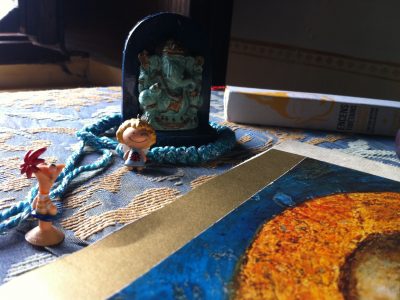
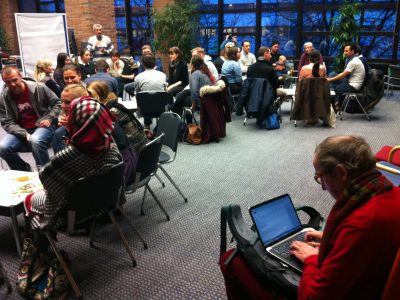
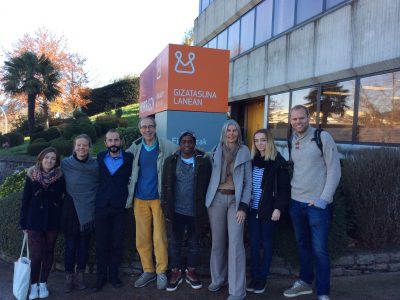
third YES gathering, Spain
I learned a lot in mutual talks. I started off with some information about our unlimited pilgrimage, your motivation and mine, and some stories from our path. Almost every time, a field of mutual respect and trust unfolded and, in this atmosphere, people opened up and we could hear the most wonderful stories from them, too. Everybody has a story that is worthwhile listening to. People just need the right space and audience. So, our green thoughts are not merely about us and our journey. It is about listening to the people and getting into deep dialogue. That is where the values and topics we stand and walk for are realized, topics like life’s journey; pilgrimage and migration or freedom from fear; courage and social commitment; or cosmos, man and culture. These topics are derived from my work with oralab, or cooperatives, alternative money systems, and my (lack of) possessions.
One lesson I learned was that you can’t argue with fundamentalists—be it about politics, religion, or food—but you can listen and learn how they click, what is driving them (crazy). And if you manage to look at them with an open heart, you can see their wounds and fears, which will resolve your own uneasiness.
In the end, it is not so much about what you are talking about and who says the most reasonable thing. It is how we talk and how deeply we look at each other. Sometimes the latter is more connecting than any words.
After one year of this pilgrimage, what is the essence into society for you?
Throughout the time when we decamped from home until now, our life path has been unfolding. The coincidences, the serendipities, the synchronicities—which are just God’s way to stay incognito—were so continual that my trust in our guidance and the meaning of everything that comes across our path has been growing more and more. The essence? Martin Buber put it so beautifully: all real living is meeting. We are living in troubled but also very interesting times. To make the times better, we have to give ourselves to life.
